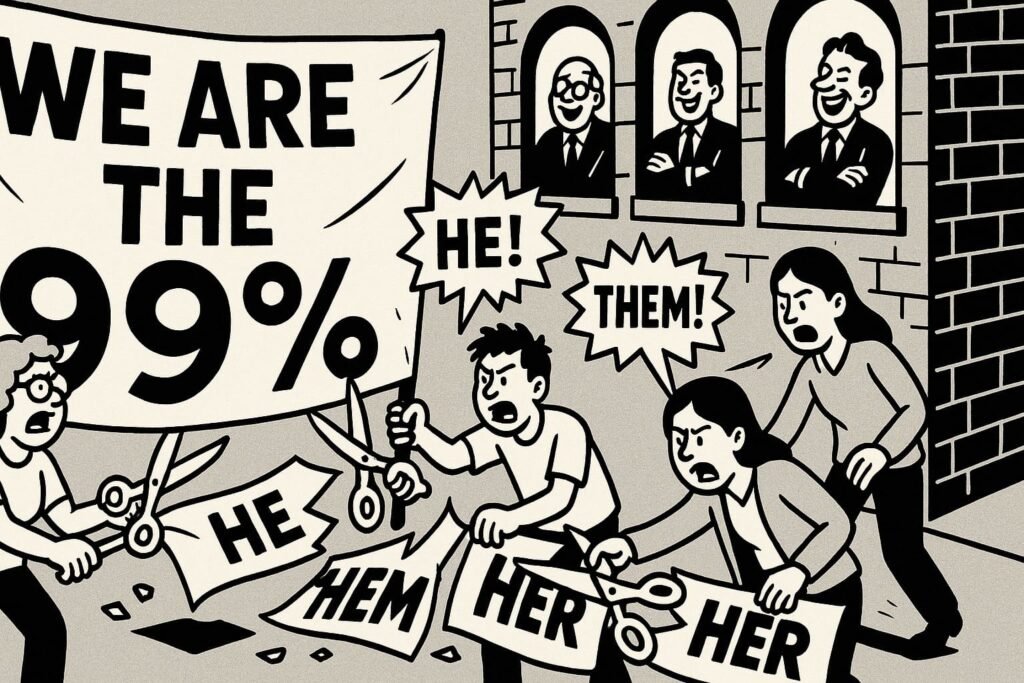Occupy Wall Street Explained – The Protest That Backfired
From Class Struggle to Culture Wars
Occupy Wall Street began in 2011 as a raw outburst of economic anger. The banks had crashed the economy, governments bailed them out, and ordinary people were left with debt, unemployment, and foreclosures.
The slogan was sharp and simple: “We are the 99%.”
For a moment, it looked like class politics had returned.
But instead of reforming the system, Occupy gave elites a survival manual. Corporations and governments learned a new trick: adopt the language of protest — fairness, inclusion, diversity — while carrying on as usual.
Occupy didn’t topple Wall Street. It taught Wall Street how to hide.
Table of contents
What Was Occupy Wall Street?
Occupy wasn’t led by a party or a single figure. It was messy, leaderless, and fuelled by outrage. Its camp at Zuccotti Park became a symbol of defiance and spread worldwide.
Its central message was clear:
- The richest 1% control wealth and power.
- The 99% struggle under debt, inequality, and rigged markets.
For once, inequality was the main story in politics.
Why It Failed to Change Wall Street
Occupy shouted, but it never legislated.
- No banks were broken up.
- No CEOs went to jail.
- No structural reforms followed.
Why? Because it had no clear demands and no leadership. Elites could simply wait it out.
But they learned something dangerous: direct economic anger was a threat. Culture wars were safer.
How It Changed Politics and Business
Occupy’s real legacy wasn’t reform — it was a playbook. Within a few years, debates about class and wealth gave way to debates about identity, diversity, and representation.
- Politics: Instead of regulating finance, politicians shifted into Identity Politics. It divided voters into tribes rather than uniting them as the 99%.
- Corporations: Villains of 2008 rebranded as allies of progress. They embraced Corporate Branding and ESG pledges to look virtuous while avoiding real reform.
- Education: Schools and universities absorbed the language of oppression and privilege — see Education & Curriculum Changes.
- Media: Inequality lost the front page to endless Media & Language Battles. Narratives about identity were easier to manage than hard questions about money and power.
Occupy didn’t kill class politics. It buried it under a new, more manageable layer of woke politics.
The Birth of Everyday Woke Politics
This was the pivot:
- Corporations realised it was cheaper to post a diversity slogan than pay higher taxes.
- Politicians realised it was safer to legislate cultural symbols than tackle inequality.
- Media realised identity wars made better headlines than charts on wealth distribution.
The 99% stayed squeezed, but they were encouraged to fight each other over identity instead of fighting the 1%.
Why It Matters Today
Occupy Wall Street is often remembered as a failure. In terms of reform, it was.
But its deeper legacy is everywhere. It showed elites how to absorb protest without changing. How to trade redistribution for representation. How to turn rage into branding.
That’s why you’ll see banks posting about diversity or tech giants waving rainbow flags while funneling profits offshore. They learned the formula in 2011.
Occupy didn’t end inequality. It disguised it.
Conclusion: The Protest That Backfired
Occupy Wall Street should have been a turning point against corporate power. Instead, it became the birthplace of woke politics as corporate survival strategy.
Its message — we are the 99% — was clear and unifying. Its legacy — culture wars, branding, and division — is anything but.
👉 Want the bigger picture? Explore our full Activism Explainer Hub to see how movements, tactics, and ideologies shape modern politics.
FAQ
What was Occupy Wall Street?
A 2011 protest against economic inequality and corporate power, sparked by the 2008 crash.
Why did Occupy fail?
It had no leaders, no demands, and no strategy beyond protest. Elites simply outlasted it.
How did it change politics and business?
It shifted the conversation from class to identity. Corporations embraced woke branding, politicians embraced culture wars.
Why is Occupy important today?
It explains why class struggle vanished from politics, replaced by woke politics.
What’s the irony?
Occupy exposed inequality, then taught elites how to hide it better.
Cross-links:



